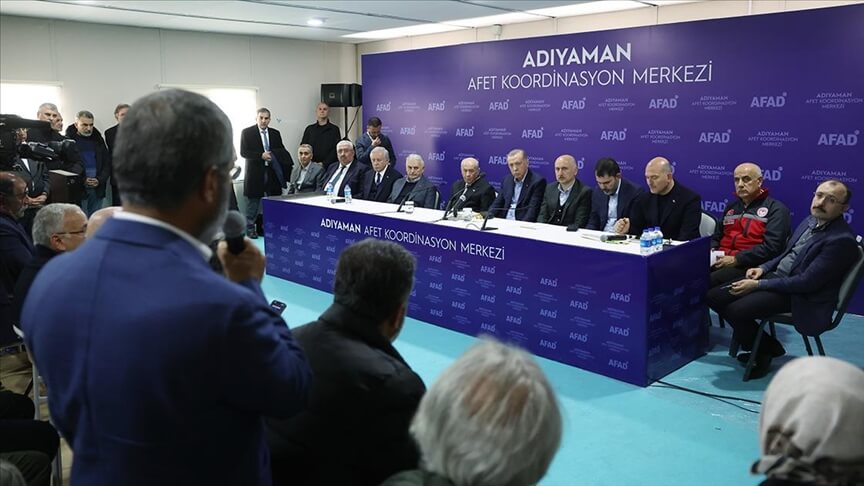Turkish President Recep Tayyip Erdoğan, who until Monday had been defiant in the wake of widespread criticism of his government’s handling of an earthquake disaster, has asked for forgiveness for rescue delays in one of the provinces hit hardest by the earthquake, Agence France-Presse and Turkish media outlets reported.
Erdoğan, who is seeking another term as president after two decades in power, has received strong criticism from earthquake survivors, especially those in Adıyaman in the southeast.
In the last election in 2018, Erdoğan handily beat his secular opposition rival in that province.
“Due to the devastating effect of the earthquakes and the bad weather, we were not able to work the way we wanted in Adıyaman for the first few days. I apologize for this,” Erdoğan said.
The Feb. 6 quakes killed more than 44,000 people in Turkey and thousands more in neighboring Syria.
AFP reported on the locals’ anger with the government from Adıyaman on Feb. 10.
“I did not see anyone until 2:00 p.m. on the second day after the earthquake,” Adıyaman resident Mehmet Yıldırım told AFP at the time.
“No government, no state, no police, no soldiers. Shame on you! You left us on our own.”
Erdoğan’s apology has come in the wake of recent calls for his government’s resignation for failing to prepare the country against earthquakes given the fact that it lies on major fault lines and is frequently struck by deadly temblors.
The fans of two major İstanbul football clubs, Fenerbahçe and Beşiktaş, over the weekend called Erdoğan’s government to resign, shouting slogans during their matches and putting responsibility for the tragedy on its shoulders.
The catastrophe struck just as Erdoğan was gaining momentum and starting to lift his approval numbers from a low suffered during a dire economic crisis that exploded last year.
Erdoğan’s government has come under growing pressure on social media for what his critics view as a slow response to Turkey’s biggest earthquake in nearly a century.
The government is mainly accused of failing to mobilize enough people for relief efforts and a lack of coordination among the teams, which resulted in civilians in some regions trying to pull their loved ones from under the rubble themselves and finding them frozen to death although they sustained no critical injuries in the collapse.
The government is also criticized for failing to provide safe shelter to the earthquake survivors and meeting their basic needs although there is an ongoing massive relief effort in Turkey and overseas for the earthquake survivors.
Although Erdoğan admitted at the beginning that there were some shortcomings in the search and rescue efforts, he was mostly defiant until adopting an apologetic tone on Monday.
Last week, he used harsh language against people who were criticizing his government for failing to distribute a sufficient number of tents to earthquake victims, referring to people asking about tents from Kızılay (Turkish Red Crescent) as “dishonest, immoral and vile.”
Erdoğan’s handling of the biggest natural disaster in his two-decade rule could prove crucial ahead of tightly contested parliamentary and presidential elections, which were to be held on May 14 but could be postponed to June due to the earthquakes.
Opposition not forgiving
Meanwhile, the pro-Kurdish Peoples’ Democratic Party (HDP) launched a hashtag on Twitter following Erdoğan’s remarks, saying they are not forgiving him for a number of reasons.
The party said it is not forgiving people who collected taxes for earthquake readiness but used them for other purposes, transferred millions of lira to the construction sector, caused thousands of people under the rubble to freeze to death, treated the Turkish Red Crescent and state disaster agency as their own backyard and issued construction amnesties to contractors violating the country’s building code.
In a similar move, opposition Deva Party leader Ali Babacan said Erdoğan cannot absolve himself of responsibility merely by asking for forgiveness.
“How many people lost their lives due to the delays in the first 48 hours [after the earthquakes],” Babacan asked.
